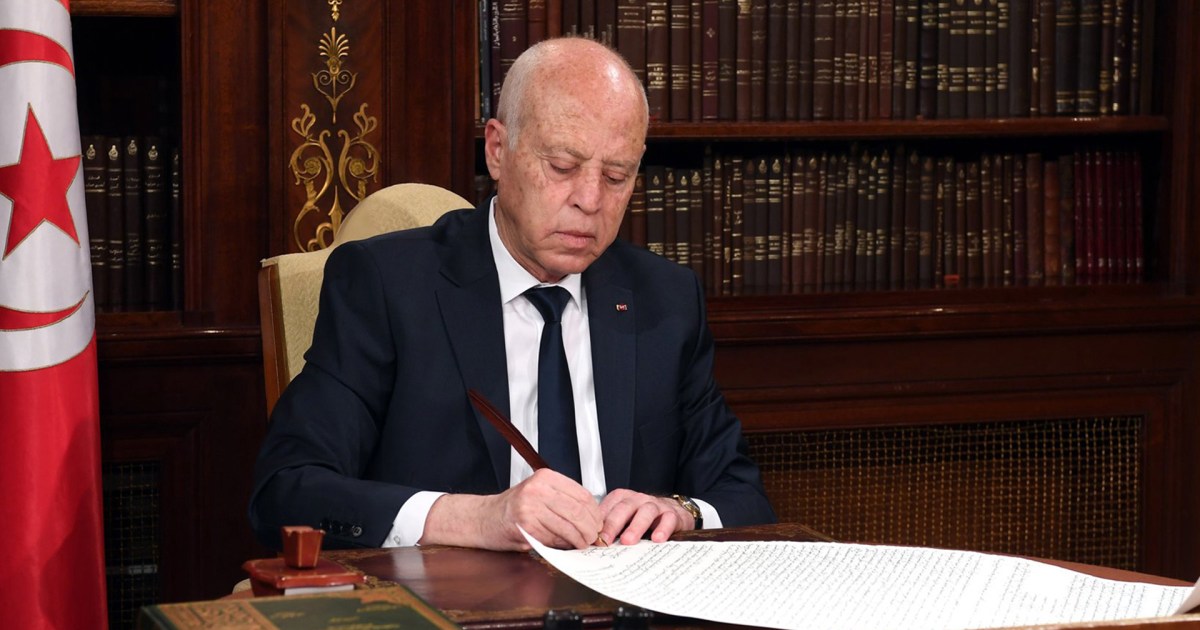Tunisian President Kais Saied issued a presidential order to continue the exceptional measure that suspends all the powers of the House of Representatives and lifts the immunity of its members, which the Ennahda movement considered a step towards abolishing the constitution.
According to the presidential decree, Saeed decided to put an end to all grants and privileges granted to the Speaker and its members.
The presidency said that Saeed decided to continue implementing constitutional provisions that do not conflict with exceptional measures, in addition to canceling the temporary authority to monitor the constitutionality of laws.
The statement stated that the President of the Republic is in charge of preparing draft amendments related to political reforms and the assistance of a committee to be organized by presidential order.
For his part, Ennahda Party leader Rached Ghannouchi told Reuters, "Said's move today is about canceling the constitution, and we do not agree to this."
The Ennahda movement, which has the largest parliamentary bloc with 53 deputies, announced in a statement yesterday, Tuesday, its rejection of Said's direction to approve "transitional provisions", considering that he is determined to abolish the constitution, and warning against the "disintegration of the state" if its exceptional measures continue.
Last Monday, the Tunisian president announced - in a speech from the state of Sidi Bouzid (center) - that "exceptional measures will continue, and transitional provisions have been put in place (without clarification), while preserving everything stated in the constitution," referring to the beginning of preparations for the enactment of laws. Transition and amendment of the electoral law.
party rejection
On Tuesday, 4 Tunisian parties announced their refusal to suspend the constitution or extend the work of exceptional measures without horizon, warning that this situation reinforces individual rule and threatens the return of tyranny.
Tunisia has been suffering from a severe political crisis since its president, Kais Saied, decided last July 25 to dismiss Prime Minister Hisham Al-Mashishi, provided that he assume the executive authority with the help of a government whose president is appointed, in addition to freezing the powers of Parliament, lifting the immunity of deputies, and being headed by the Public Prosecution.
Yesterday, Tuesday, the general secretaries of the "Democratic Current" parties (Social Democratic: 22 deputies out of 217), "Afaq Tounes" (liberal: two deputies), "Democratic Bloc for Labor and Freedoms" (Social Democratic: Without Representatives) and "The Republican" met (Center: Without Representatives) with the Secretary-General of the Labor Union (the largest union organization) Noureddine Taboubi at the union headquarters in the capital, according to a statement by the Republican Party.
The four parties expressed, according to the statement, their "deep concern about the continued ambiguity and pushing the situation towards further escalation and tension, at a time when the country needs to deal calmly with the repercussions of the crisis, which is now threatening state institutions with complete paralysis."
And she stated her "rejection of all explicit and convincing calls to suspend the constitution or to extend the work of exceptional measures without horizon," warning that this situation "consolidates individual rule and threatens the return of tyranny."
And she called for "accelerating the assignment of a prime minister to confront the priority economic and financial files, and to cut off all the negative aspects of the previous administration of governance institutions."
The fall of legitimacy
For his part, former Tunisian President Moncef Marzouki said that Tunisian President Kais Saied's announcement of the existence of transitional provisions is a signal of the end of the constitution, which means the president's legitimacy will fall permanently and he must be removed and tried, according to him.
This came in a speech delivered by Marzouki, yesterday evening, Tuesday, to the Tunisian people, which was broadcast on his official page on Facebook.
Al-Marzouki said, "Saeed's talk about setting transitional provisions means canceling the constitution, which means going in the enactment of custom-made laws.
Al-Marzouki reiterated that "Said is upside down and can only be described as that, and his legitimacy is eroded and will end, and the removal of the man and his referral to trial becomes a serious issue."

